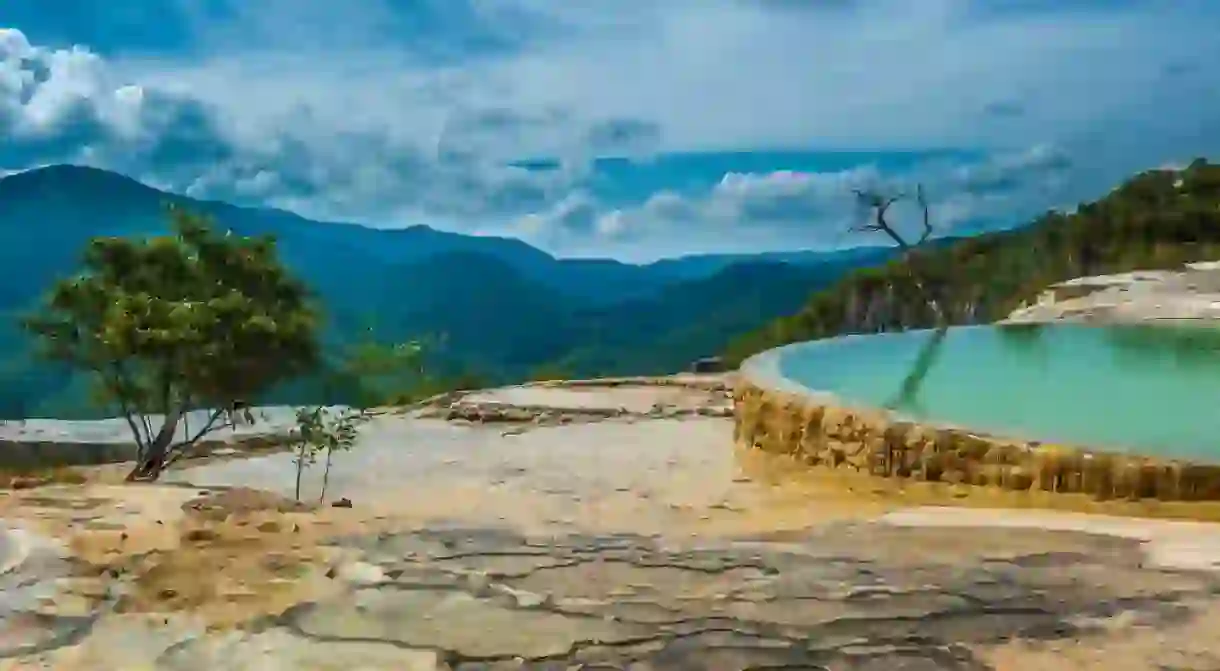The 10 Most Beautiful Destinations to Visit in Oaxaca, Mexico

Oaxaca state is a hotbed of culture, from ancient indigenous ruins to beach yoga opportunities and (arguably) the best chocolate in the world. Whether you want to surf waves, spot dolphins or browse the best arts and crafts in Mexico, you can do it in Oaxaca.
Stretching from the mountains to the sea, the state of Oaxaca in the south of Mexico is celebrated as a bedrock of indigenous culture as well as the arts and crafts capital of Mexico. Then there are the rock formations at Hierve el Agua, the untouched sandy beaches in Zipolite and the pre-Hispanic ruins at Yagul.
Oaxaca City
Architectural Landmark

A trip to Oaxaca wouldn’t be complete without a stopover in its capital city. If you’re flying in, you’ll likely land in Oaxaca City anyway, so it makes sense to make the most of it straight away. Oaxaca’s zócalo (main square) is right in the middle of downtown. Stalls and street vendors pack out the plaza – make sure you try Oaxacan chocolate, arguably the most important export from the area – and the 16th-century Metropolitan Cathedral towers overhead. Nearby, in the colonial center, artisan markets, museums and regional meals await.
Puerto Escondido
Natural Feature

Surfers flock to Puerto Escondido for sun, sand and some of the best waves in Mexico. The town has a reputation for being laid-back and you won’t find mega-resorts like those in Cancún or Puerto Vallarta here. Even if you’re not there to hang ten, you’ll still want to get in the water. Head to the Manialtepec Lagoon, just 20 minutes outside of town, which is one of the few places where you can swim with glow-in-the-dark, bioluminescent plankton that light up the lake.
Monte Albán
Archaeological site, Ruins

Mazunte
Architectural Landmark
Down the Pacific Coast, sleepy surf towns dot the shore. One of these is Mazunte, a pueblo mágico (meaning it has special status from the tourism board) known for its black-sand, volcanic beach, Playa Mermejita. Yoga teachers offer classes year-round on the beach and, depending on the season, you may be able to spot dolphins, whales or tortoises breaking the water from a tour starting at Playa Mazunte.
Zipolite
Architectural Landmark

Right down the coast from Mazunte, Zipolite is another hidden-away, laid-back village, but with a slightly more risqué reputation. Zipolite’s Playa del Amor, on the edge of town, has long been a popular, clothing-optional beach, where it’s not uncommon to see swimmers baring all in the water. Now, attitudes at the town’s main beach, Playa Zipolite, are also relaxing, thanks to a nearby nudist hotel and the beach’s annual nudist gathering.
Hierve el Agua
Spa, Natural Feature

You won’t find hot springs at Hierve el Agua – which literally translates as “the water boils” – but you can swim in the small mineral-heavy waters, said to have healing powers, at the top of the tall rock formation. Mineral buildup over the years has created the illusion of two white-rock waterfalls down the cliff. While this is a trip worth making, double-check that it’s open before you go, as the site is often closed due to disputes between the state and nearby communities.
Bahías de Huatulco
Natural Feature
Even further down the coast from Puerto Escondido and Mazunte, the nine bahías (bays) of Huatulco are a set of off-map beaches that have just been uncovered from the surrounding thick forest in the past few decades. One – the bay of Cacaluta – even stood in for the fictional Heaven’s Mouth beach in Alfonso Cuarón’s 2001 film Y Tu Mamá También. The waves at Bahías de Huatulco are less intense than in Puerto Escondido, so if you’re new to surfing, this might be the place to pick up a board.
Mitla
Architectural Landmark

To the southeast of Oaxaca City, Mitla once held an important role for the Zapotec people. While Monte Albán was the political powerhouse, Mitla (translating to “place of the dead”) served a religious role as a sacred burial site. Here, you’ll find intricately carved stonework unlike anything else in Mesoamerica, along with the Church of San Pablo, which the raiding Spanish placed on top of the conquered city.
Yagul
Natural Feature
Down the road from Mitla, Yagul was an ancient Zapotec city-state occupied as early as 500 BCE, although cliff paintings in the area date back to at least 3,000 BCE. You can get a sense of ancient Zapotec life by exploring the site’s three areas: a fortress formed from volcanic rock, the ceremonial center and the residential living quarters on the outskirts of the ruins. There’s even a labyrinthine palace, hidden tombs and the second-biggest ancient playing field in all of Mesoamerica on the grounds.
Punta Cometa Lookout Point
Natural Feature

It’s worth stopping in Mazunte just for the incredible vistas from this viewpoint. It’s the best vantage point in the village, And we recommend arriving at dusk to see the sun sink across the horizon in streams of yellows, oranges and purples. Or, if you’re an early riser, do the opposite: watch the sun creep up from the east, then go for a swim on Mazunte Beach before it gets too hot.
Inspire your itinerary with the best things to see in Oaxaca state, as well as the top things to do in Oaxaca city. Don’t miss the best restaurants in Oaxaca City.
The Best Trips and Tours in Mexico
Historical Landmark

Mexico is one of the most exciting countries in North America, if not the world, with its lively city streets brimming with culture, music and some of the best street food you’ll find anywhere. But it’s also a country of fascinating history and amazing natural wonders, with Aztec and Mayan temples found right next to mystical cenotes.













